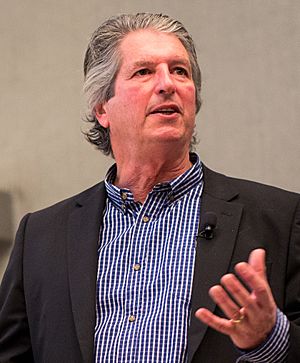Martin Green (professor) facts for kids
Quick facts for kids
Martin Green
|
|
|---|---|

Martin Green in 2015
|
|
| Born |
Martin Andrew Green
20 July 1948 Brisbane, Australia
|
| Citizenship | Australian |
| Alma mater |
|
| Awards |
|
| Scientific career | |
| Fields |
|
| Thesis | Properties and applications of the metal-insulator-semiconductor (MIS) tunnel diode (1974) |
| Doctoral advisor | John Shewchun |
Martin Andrew Green AM FRS FAA (born 20 July 1948) is an Australian engineer and professor at the University of New South Wales who works on solar energy. He was awarded the 2021 Japan Prize for his achievements in the "Development of High-Efficiency Silicon Photovoltaic Devices". He is editor-in-chief of the academic journal Progress in Photovoltaics.
Education
Green was born in Brisbane on 20 July 1948, and was educated at the selective Brisbane State High School, graduated from University of Queensland and completed his PhD on a Commonwealth Scholarship at McMaster University in Canada, where he specialised in solar energy.
Research
In 1974, at the University of New South Wales, he initiated the Solar Photovoltaics Group which soon worked on the development of silicon solar cells.
In the early 1980s, Green developed numerous technologies that increased the efficiency of solar power generation. Many of Green's students during this period later became significant in the development of China's solar industry, including Shi Zhengrong.
Green has published several books on solar cells both for popular science and deep research. The "buried contact solar cell" was developed at UNSW in 1984. Green also served on the Board of the Sydney-based Pacific Solar Pty Ltd (later known as CSG Solar), as Research Director.
Awards and honours
Green has received many awards including:
- 1981 Pawsey Medal (Australian Academy)
- 1988 Award for Outstanding Achievement in Energy Research
- 1990 IEEE Cherry Award
- 1992 CSIRO External Medal
- 1995 IEEE Ebers Award
- 1999 Australia Prize
- 2000 Gold Medal from the Spanish Engineering Academy
- 2000 Medal of Engineering Excellence for Distinguished Achievement in the Service of Humanity from the World Engineering Federation (Hannover, 2000)
- 2000 Millennium Award from the World Renewable Congress
- 2002 Right Livelihood Award for "his dedication and outstanding success in the harnessing of solar energy, the key technological challenge of our age."
- 2003 Karl Böer Solar Energy Medal of Merit Award from the University of Delaware
- 2006 Finalist, European Inventor of the Year (together with Stuart Wenham)
- 2008 Winner, 2008 New South Wales Scientist of the Year Award
- 2009 Zayed Future Energy Prize finalist, recognised at the award ceremony for his ground breaking research in photovoltaic (PV) technology that will result in increased efficiencies, bringing solar energy closer to grid parity.
- 2012 Member of the Order of Australia "for service to science education as an academic and researcher, particularly through the development of photovoltaic solar cell technology, and to professional associations."
- 2013 Fellow of the Royal Society of London
His nomination for the Royal Society reads:
Professor Green is cited for his extensive and distinguished contributions to photovoltaic science and technology. These include identifying the fundamental limits upon silicon solar cell performance and then leading his team to demonstrate experimental devices approaching this limit, with 25% cell efficiency now demonstrated. This is over 50% relatively higher in performance than at the beginning of his work. He has also developed innovative commercial versions of these high performance devices and pioneered the field of "third generation" photovoltaics, investigating advanced photovoltaic device concepts targeting Carnot-like solar conversion efficiencies.
- 2015 James Cook Medal of the Royal Society of New South Wales
- 2016 Ian Wark Medal and Lecture
- 2018 Celebrated Members of IEEE Electron Devices Society
- 2018 The Global Energy Prize for research, development and educational activities in the field of photovoltaics that have revolutionized the efficiency and costs of solar photovoltaics, making this now the lowest cost option for bulk electricity supply
- 2021 Japan Prize
- 2022 Millennium Technology Prize
- 2023 Queen Elizabeth Prize for Engineering for invention of PERC solar photovoltaic technology, alongside Andrew Blakers, Aihua Wang, and Jianhua Zhao. On December 20, 2023, he was awarded the VinFuture Grand Prize for his involvement in the same innovation, along with M. Stanley Whittingham, Rachid Yazami, and Akira Yoshino.
- 2024 Sydney Ferries named a brand new Parramatta River-class ferry after Martin Green

